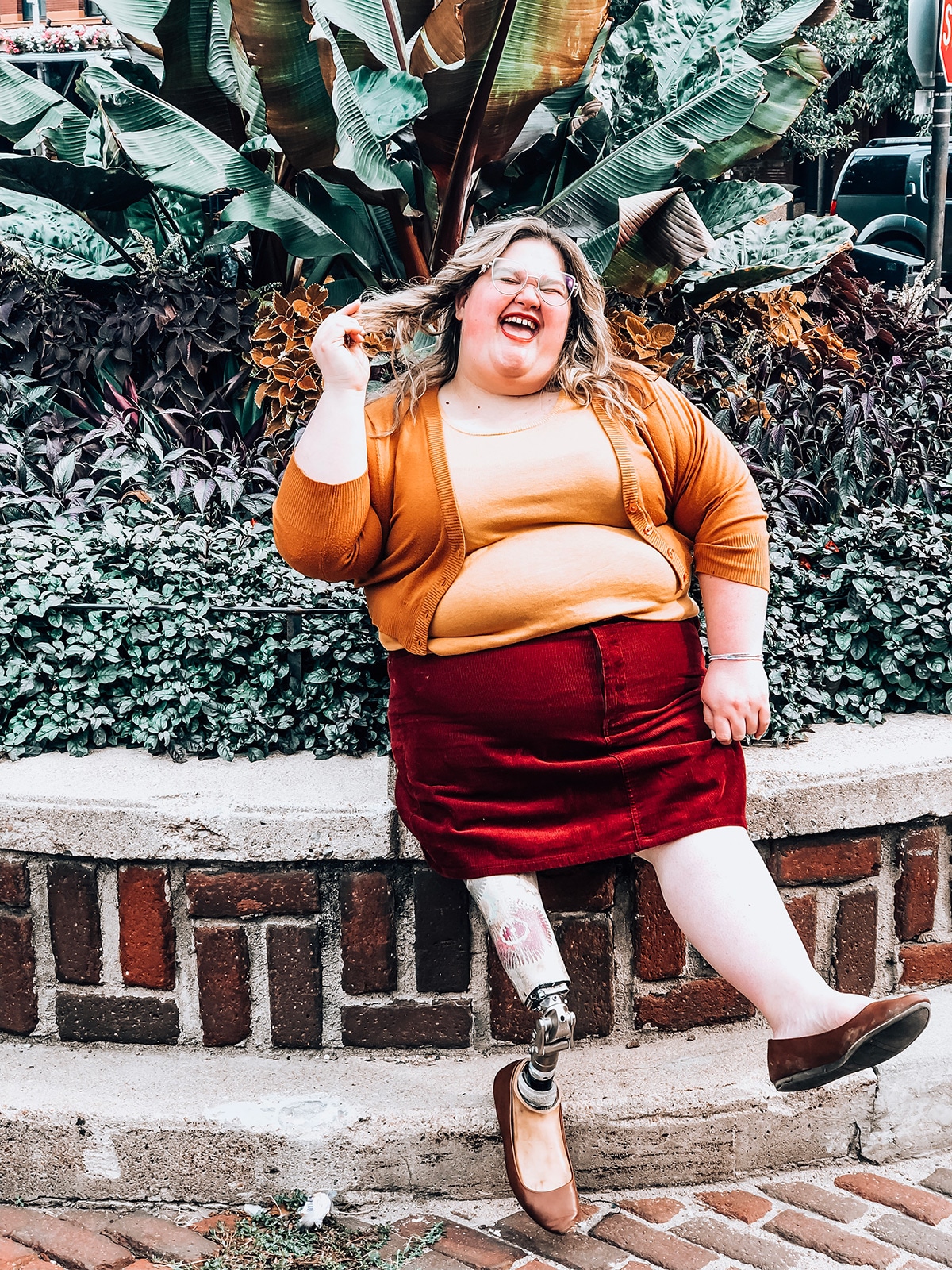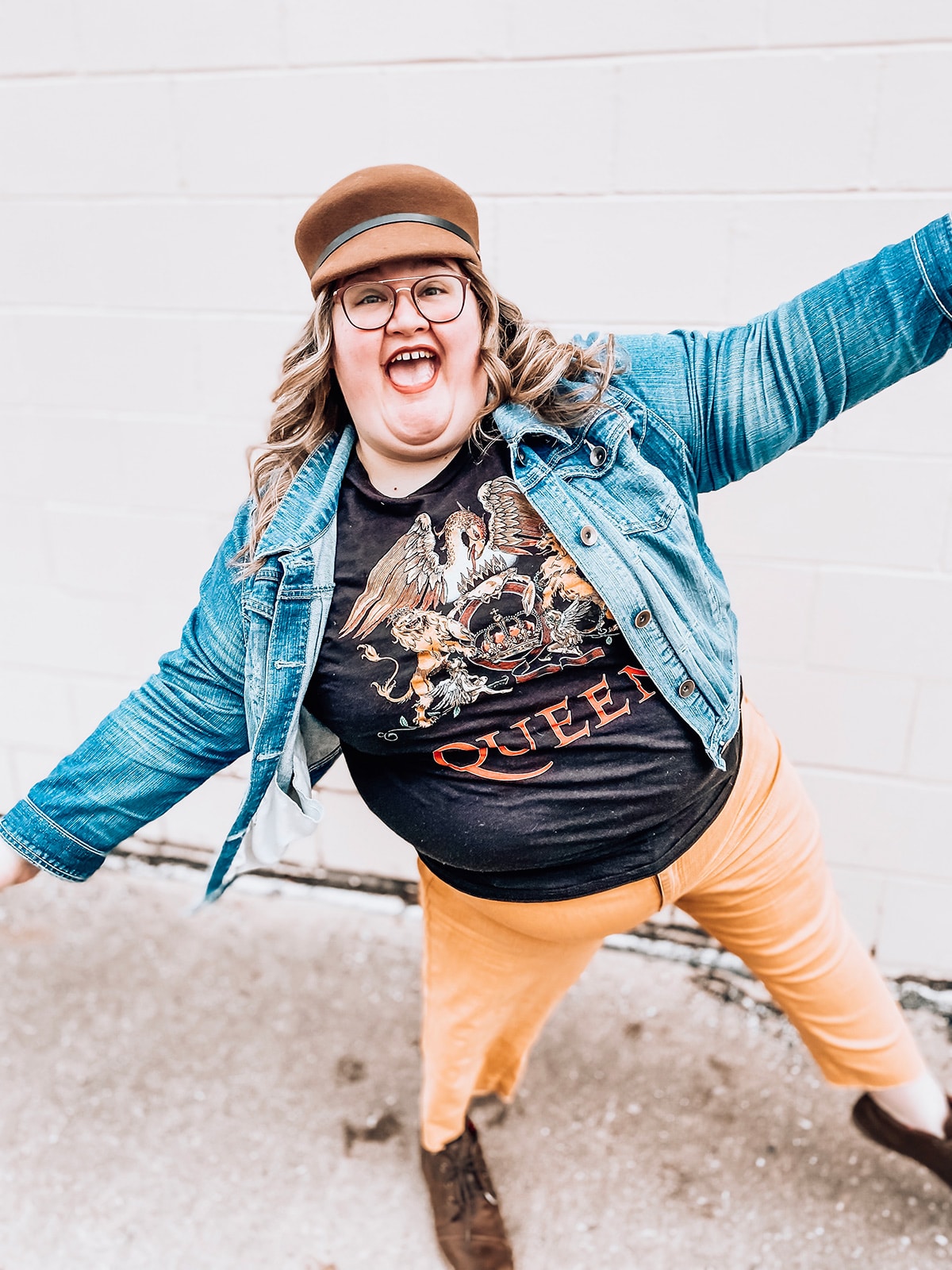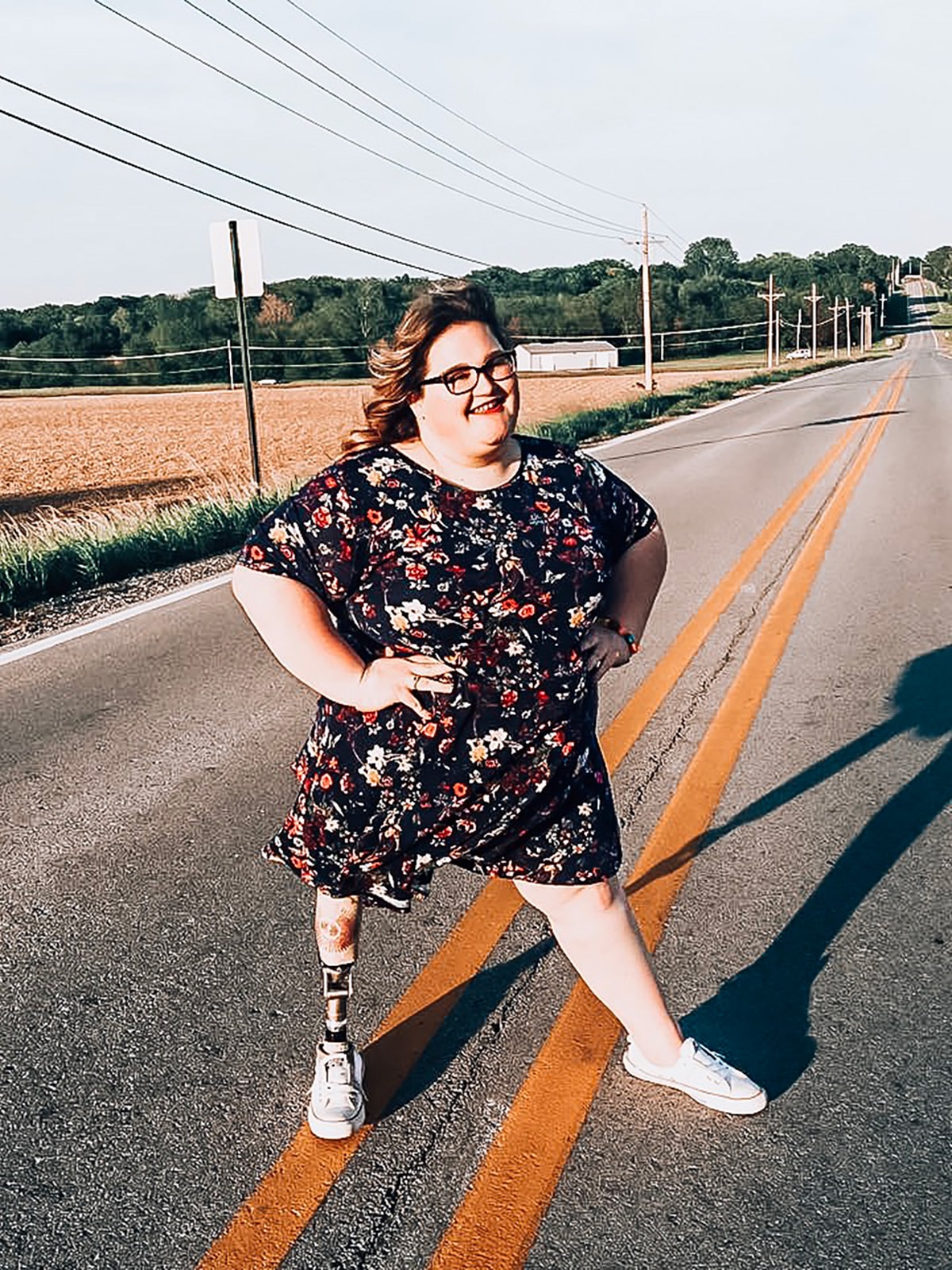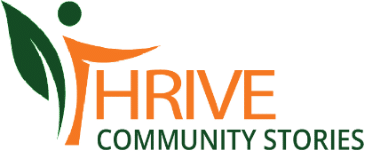By Carol Blymire
Body positivity is a social movement rooted in the belief that all human beings should have a positive body image, while challenging the ways in which society presents and views the physical body. We interviewed Toni Furmanski, a body-positive blogger and Instagram influencer who also happens to be living with limb loss and limb difference. She encourages us to think differently – about body acceptance and body liberation when it comes to how we feel about who we are.
What about health and wellness is most important to you?
I want to make sure my mental health is my number-one priority. I do a lot of meditation and I have been practicing breathing techniques for about a year now for when I am feeling stressed. I try to remember there is no such thing as good and bad food. And, I try to move my body and stretch my muscles as much as I can because it helps relieve back and hip pain. Those are the things I focus on the most.
When we talk about health and wellness, one of the things we hear a lot in the media lately is about self-care. What does self-care look like for you?
Sometimes I think we hear self-care and we think of getting our nails done, doing a face mask, a little retail therapy, maybe a game of golf. And it can totally be all those things. Sometimes self-care is whatever makes you feel better at the time. But, I think self-care should also be a deeper level of taking care of yourself. Are you doing those things to avoid a problem? Are you digging deep inside to heal old wounds? For me, I actually feel like my Instagram has been such a great way for me to realize I wasn’t as okay as I had assumed I was. The more I was posting, the more I realized I had issues I was pushing down and hiding from. It’s almost like journaling for me.

Your Instagram account is awesome! What excites you most about blogging and sharing who you are on social media? What has this kind of community-building effort been like for you?
I’ve been doing this for three years now and it still gets me when I get a message or a comment telling me that I’ve made some sort of difference either for someone who found my page and was encouraged to try a clothing item they were afraid to try, or sometimes I get messages from fellow amputees or family members of amputees who tell me they love hearing about my funny stories because it’s relatable to them. I also hope I have made some sort of difference for people who have never been around someone with a disability, so it’s not so shocking when they see someone in the world who has one.
Do you feel like the limb loss and limb difference community is well represented on social media? What can people in our community do to make sure their stories are heard?
I have found a lot of people on social media who have limb loss and limb differences because I search for them, or they have followed me. We are all out there, we just have to keep talking and sharing our stories. And, to be totally honest, I think representation in other forms of media are more important. My hope is for people to see my page and to see snippets into my life, but then to turn around and try to take my advice and use my experiences to make a difference in their real life. I want them to see we need people with disabilities or people who are plus size to have a seat at the table in order for bigger changes and more representation to happen.
What does the word STRONG mean to you? Who do you know who epitomizes the word STRONG, and why?
Strong, to me, has changed so much over the years. I think it started off as showing no weakness and being independent, and proving I can handle situations so people didn’t think I was less than because of my disability. But now, I think there is so much strength in talking about what makes us vulnerable. So we can take the power back over those things.
Oh gosh, the strongest person in my life is my mom. I mean, she’s just always been the person I go to when I’m having a bad day, or when I need support. I can’t even count the times I’ve cried to her about anything and everything, and she’s always been able to comfort me.

What advice do you have for young men and women in the limb loss and limb difference community about how to feel strong?
I think you just have to realize there will be days where you feel strong, and there will be days where you feel weak. And, that’s okay. It’s perfectly okay to not feel okay. Honestly, strength can come from within, but I also think you have to surround yourself with people who support you and encourage you. I have friends and family who have always, always, always been on my side and in my corner and who help me remember how strong I am.
What are you excited about in 2020? Have you set any goals for yourself for this year?
I have set some goals, but nothing too serious. Last year I set, like, 10 goals and only accomplished four, but then when I looked back at my year I had done some really wild things I hadn’t even in my wildest dreams thought I could put on my list. Like walking on a runway during New York Fashion Week That wasn’t something I ever thought would have been possible and it happened. So I am taking it easy on my goals this year and making them a bit more achievable. I mostly want to focus on putting out more content that is less like the things I was putting out last year. I want to do different things.
You write a lot about the importance of kindness. What does kindness mean to you, and how can we help foster more of that among our fellow human beings?
Oh, kindness is something I find so powerful. It’s amazing how different my life got once I started to be kind to myself. I started off with simple things like small positive affirmations, and sometimes they felt phony and fake, but eventually I started to believe them and I started to feel those positive things in my bones. And, wow, once I was kinder to myself, it was so much easier to be kind to other people as well.
You’re known for being so influential in the area of body positivity. Let’s talk about that. What does body positivity mean to you, and how can others learn to be confident in their own bodies?
I like to talk more about body acceptance and body liberation because I think the term “body positivity” has become so watered down and is almost always confused with self-love at this point, that it lost its original meaning. There is a difference between self-love and body positivity. Self-love is feeling good about who you are. It’s for every person in the world. It’s what I think we should all strive for.
The body positivity movement was meant to be a safe space for those who have marginalized bodies — for the people society kind of looks down on, or rarely recognizes. The best way I can think to explain body positivity is if I (someone who is obviously plus size) posted a photo in a swimsuit and someone who is thinner posted a photo of themselves in the same exact swimsuit, there is a high chance the thinner person would be praised for posting themselves in a swimsuit and be called brave and beautiful and all kinds of really positive comments. And while I will probably get those comments as well, I will also have a handful or more of negative comments that tell me that basically I should be ashamed of my body.
But when it comes to feeling good about your body, I think all bodies are beautiful. I truly believe that. And I think the best way to feel good about your body is to just start complimenting it. When I notice myself saying something negative about myself, I basically talk to myself and ask myself how I can switch that narrative and turn it into a positive. The more I switched the narrative, the less I needed to. I had to basically retrain my brain to stop letting negativity in. It took a long time, and it’s still something I work on, and I’m sure I will always have to, but it gets easier and easier all the time.

How can people in the limb loss and limb difference community advocate for themselves when it comes to the bodies, health, and wellness — whether it’s making sure their doctors listen to them, to reaching out to clothing manufacturers to ask for inclusive sizing and design, or even finding the right health and wellness routines for them?
I don’t know how or why, but I will say I have been truly blessed when it comes to doctors. I honestly don’t know if I am the best person to answer this question because my doctors have always been so amazing. But what I do tell people is to look around for doctors. If someone doesn’t make you feel comfortable, look for someone else. And I mean, this depends on people’s insurance and things like that but, if that isn’t an issue, look around. Get second opinions. Take it from me, there are great doctors out there who have your best interests at heart.
And when it comes to clothing companies, I think the only thing we can do is continue to talk about it. We can’t settle with, “well that’s how it is, so we will just deal with it.” Because our voices matter, we can and we have made waves. Look at the adaptive Tommy Hilfiger line. That wasn’t just someone’s random idea. It was because they realized it needed to happen.
What new habits or fresh ways of thinking can people with limb loss and limb difference embrace?
Something I always have to remember when spring comes is that it’s shorts and dresses season again. This means more chances for people to see my prosthesis and probably more stares and more comments. I used to wear covers over my leg to try to blend in a little, but now I embrace my leg. I welcome the comments and look at them as opening a door to conversations and chances to normalize disabilities and differences. I realized most people don’t stare and make comments to be rude. It happens because they are curious. This may be our norm, but it isn’t theirs. So I try to give people the benefit of the doubt and try not to think of it as them judging me or looking at me, but as them trying to understand.
You can read more about Toni here:
This Amputee Has Created a Body Positive Blog to Help Normalize Disabilities (Health)
This amputee blogger is changing the conversation around body positivity (Yahoo News)
These 19 Instagrammers Deserve a Freakin’ Fashion Award from the CDFA (BuzzFeed)
Toni Furmanski — that’s how she rolls (REHACARE Magazine)

